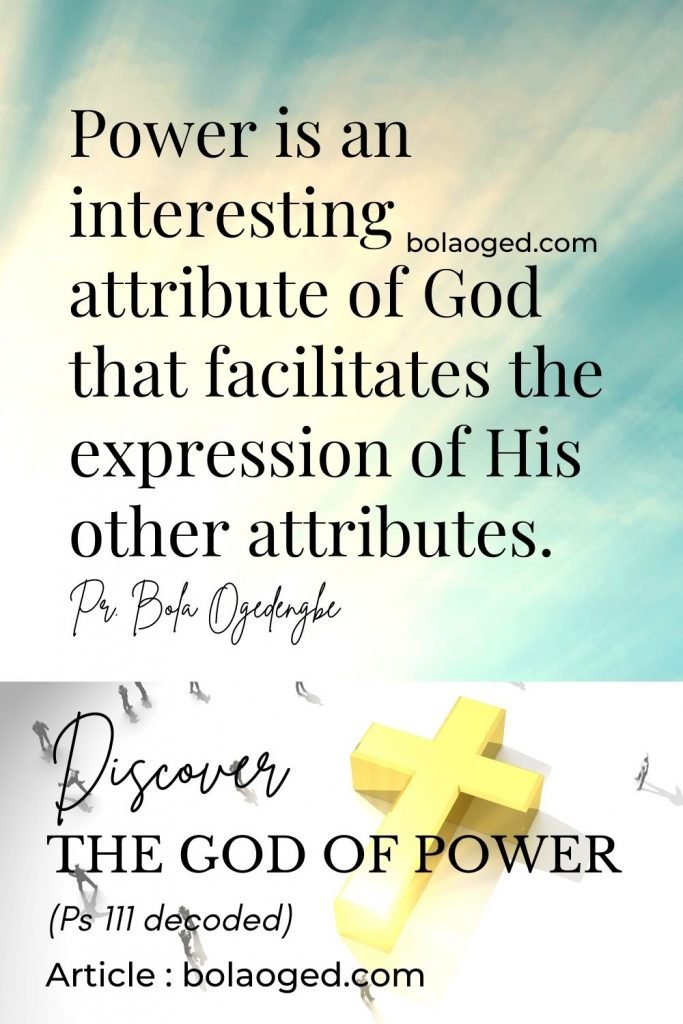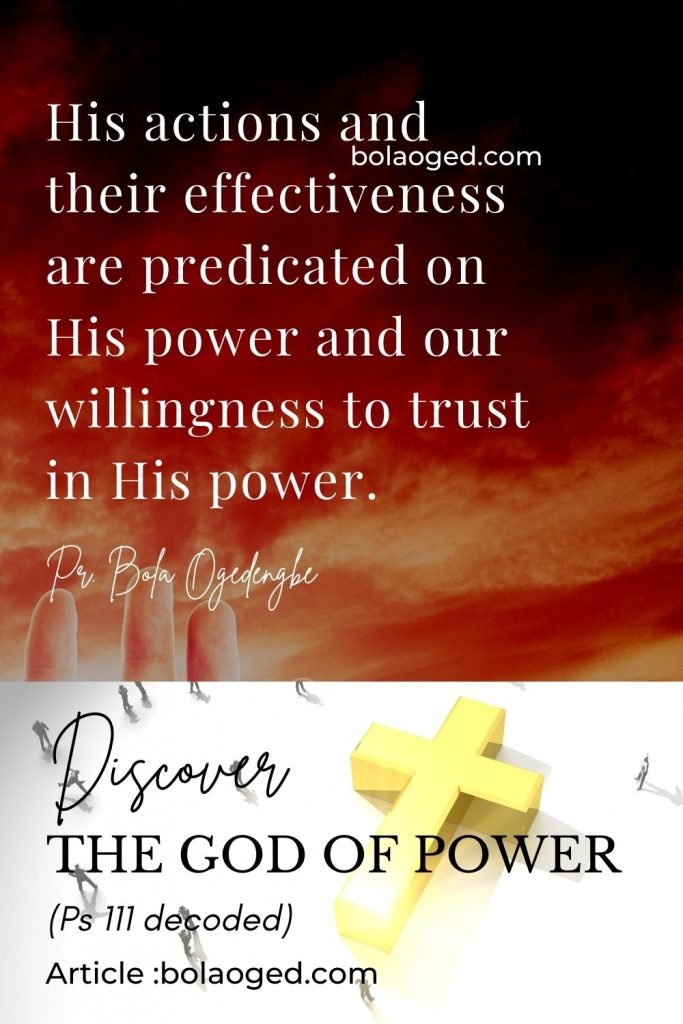Power is an interesting attribute of God that facilitates the expression of His other attributes. We say that He is good, and rightly so. But were He not to be powerful, He would have no means to express His goodness. His actions and their effectiveness are predicated on His power and our willingness to trust in His power. God is infinitely conscious of His own power, and we must be too. He speaks, as I often say, as if He is God. He knows no limits, no boundaries, no hindrances. He speaks, and for Him, it is so. Nothing can stop Him.
His works are works of power, not just works of goodness or mercy, which they are, but works of power. The psalmist says
He has shown His people the power of His works by giving them the inheritance of the nations. The works of His hands are truth and justice; all His instructions are trustworthy. They are established forever and ever, enacted in truth and in what is right.
ps 111
Over and over in the wilderness, God’s people demonstrated their lack of trust in His power to fulfil His promises. It is a danger that stalks every child of God. We must not be more consumed by the circumstances than we are conscious of His power to fulfil His promises. The psalmist celebrates the power of His works, demonstrated by His giving the inheritance of the nations to His people. In the Abrahamic covenant, God made promises to indeed give this inheritance to His people.
The fulfilment of that promise is now celebrated thanks to His powerful works. His works are powerful, done in truth and justice. Indeed, the entire passage is a song of joy, one cannot read this psalm without vibrating with delight.
The passage below says it well. He does whatever He pleases.
For I know that Yahweh is great; our Lord is greater than all gods. Yahweh does whatever He pleases in heaven and on earth, in the seas and all the depths.
Psalms 135:5-12
This is a God able to accomplish anything. The psalmist is not just saying God is powerful, he is tying that understanding of His works to a particular context. He is specific in talking about God giving His people the inheritance of the nations. He demonstrated the capacity to do all that is in conformity with His will. In other words, His ability to fulfil His covenant.
So when the psalmist speaks as he does here, he is thinking of the deliverance from Egypt, of Moses’s rod that became a serpent, the riposte of the magicians of Egypt and Moses’ victory; he’s thinking about the plagues that fell on Egypt; and how they stood before the Red Sea between the sea and the armies of Egypt. It seemed as if it was the end, despite all the great miracles they had encountered. And when it appeared all was lost, Moses stretched out his hands by divine instruction, this great power kicked into action, and Israel walked through the sea on dry land. And we discover Miriam as a great songstress, and the people rejoiced at the power of His works.
When the psalmist speaks of the greatness of His works in giving them the inheritance of the nations, he’s thinking of Mara where God intervened marvellously and provided water for them, out of the rock. He’s thinking of the generation that died in the desert because they did not believe God, but that God still brought their children through in great power and might.
What was on his mind? He must have been pondering how the people crossed the Jordan miraculously; how, when the priests put their feet into the water, it mounted up on one end, like a dam, and stood high on the other end. And the people walked through on dry ground with dry feet. He’s thinking of the memorial constructed after the crossing, to commemorate this great occurrence.
When we read a passage such as this celebrating the greatness of His works, it is imperative that we think about what these works are. Unless we do, the impact will be cursory, and we will move from a passage such as this to loud wailing and complaining over the mundane issues of life, in effect becoming guilty of the same sins as those who died in the desert. We can move from shouts of praise to groans of lamentation if we bypass contemplation.
He has declared and shown to His people, the power of His works in giving them the heritage of the nations
Psalm 77.15 (AMPC)
The contemplation of God is the answer to every circumstance of life. Think of the power deployed to feed them, keep them healthy, etc, all those years. No emergency surgery nor hospital visits, no open-heart surgery. The sheer scope of it is mind-boggling. So God does so much for us, and we still doubt.
After they had finished marching around the city of Jericho on the seventh day, following the great shout and trumpet’s blast, the wall disintegrated. How could the psalmist not have been thinking of this stupendous victory? Thus, the Lord by His great power gave Israel the inheritance of Jericho.
Joshua 10:6-15 relates the battle with the Amorite kings. God got involved in this war, fighting the enemies of Israel. He literally hurled hailstones at the Amorite kings from heaven. He caused the sun to stand still. It says that ‘the Lord fought for Israel’. How great are His works.
What happens when we believe in the power of His works?
- We grow in the knowledge of God.
- We grow in faith.
- We are delivered of anxiety.
Understanding the power of God is essential to living a life that honours Him. We will trust Him with every dimension of life because we know He has the power to change things and will use that power on our behalf. Keep the memory of His works before you constantly.



